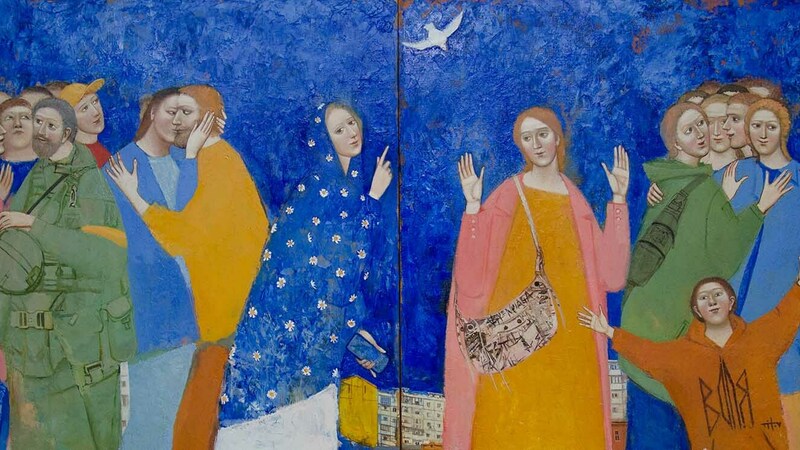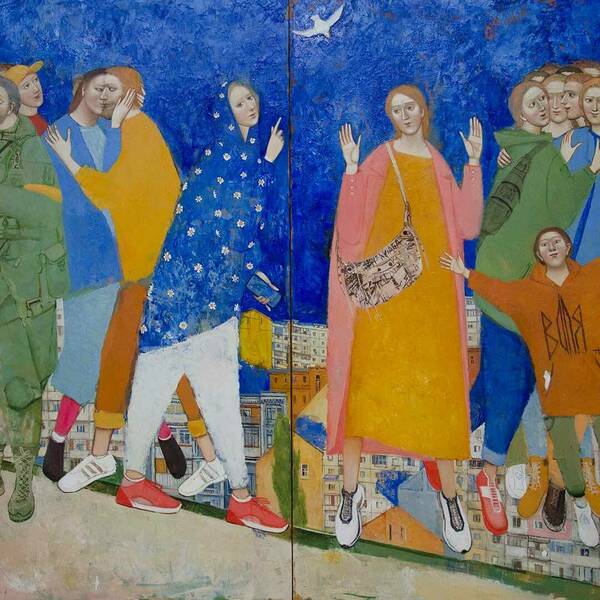
You're Alive
Analysis by Yuliia Sokolenko

How does one commit their experiences and feelings to memory during war? How do they bear witness to their wartime existence? This is a formidable task that requires the victim of war to experience reality more deeply, remember their experience clearly, and describe it accurately. One approach is to tell a story or compose a song that allows the person to share their experience widely. This is how Tember Blanche, a Ukrainian indie-pop musical duo established in Kyiv in 2020, has responded to the Russian invasion of their homeland. The band consists of two artists in their early 20s, the same age as the researchers in this project: vocalist and songwriter Oleksandra Ganapolska and guitarist and producer Vladyslav Lagoda. The duo has gained popularity in part by releasing songs on TikTok, a social media platform that is essential for reaching the Gen Z audience. Many of their songs have gone viral.
In April 2022, Tember Blanche released “Ти живий” (“You’re Alive”) as a response to the beginning of the Russian armed attack on Ukraine. This is a heartening ballad that embodies and inspires hope by celebrating the resilience and determination of the country’s defenders. This song is but one example of the ways in which artists, writers, and musicians responded to the full-scale invasion of Ukraine through art. Among these artistic genres, music performs a unique function: when anxiety creeps in, music can be a soothing balm, and in moments of exhaustion, it becomes an encouraging force. Popular music like that produced by Tember Blanche also incorporates poetry through carefully crafted lyrics. In the context of war, this blending of written word, melody, and rhythm produces a kind of prayer, where repetitions contribute to understanding and experiencing the text. Importantly, this is an art form that anybody can relate to.
An example of how music captures the experience is the illustration of "uninvited guests" which is followed not only in the song "You are alive" by Tember Blanche but also in the song "Guests" by Mia Ramari. Talking about the Russian-Ukrainian war, they usually talk about the "border." It is what shows separation between foreign territories and something beyond. Since the time of the Soviet Union, there has been a myth that Ukraine is the "younger sister" of Russia which for some reason separated. However, this notion is an imperialist invention of totalitarian Russia. Taking this into account, the illustration of "guests who come without invitation" in both songs paradoxically reflects the nature of the invasion - the invaders think that they are all being waited on as if they are guests, but in fact, they are the most unwanted invaders on Ukrainian soil. One stanza that depicts the direct reaction of the civilians to the so-called liberation of Ukraine by Russians and points out uninvited guests will not sleep peacefully on Ukrainian soil as our army "warmly" welcomes them everywhere: “An unwanted guest appeared in it, cannons thunder in the district, he is shown what true anger is.”
The repetitive nature of the refrain or chorus used in “You’re Alive” contrasts with the other parts of the song rhythmically, making specific phrases such as “You are alive” and “We are alive” stand out as assertive statements. The lyrics also reflect dynamic changes in the use of the pronouns “I,” “you,” and “we.” The author begins the song with a personal story: “Everyone knows each other in my city” and “I'm not afraid anymore, to be a barista, to sleep underground.” She gives the impression that she is used to the horror around her. As well as did I and a whole generation of young Ukrainians, who stopped imagining the war from the films or literature because accidentally it became the new reality we were compelled to get used to. That is when we gave up on finding a work-life balance and started finding a war-life one. At some point, people all over my country were challenged to walk through the rope over the precipice trying to manage the routine from previous “normal” life (as it is described in a song - working as a barista) as well as getting in the bomb shelter with your mates in the middle of your class, reassuring mom that you’re safe and sharing the solar energy lamp during blackouts. With these striking opposites, Tember Blanche built a strong image of how the definition of usual life has changed forever.
After the first chorus and refrain, the narrator speaks more to her lover, who is obviously a soldier. At this point, she uses the “you” pronoun which, in combination with “I,” creates an image of unity: “No matter how difficult it is for us at the moment, together we can send this ship.” In the following verses, the narrator dreams about the future and uses only one pronoun — “we.” She sings:
“We will meet it with the breath of spring,
We will light the fire of will courageously,
The sunflower will bloom everywhere,
Imagine the “Dream” will fly again,
We will win this battle.”
The allusion to the “Dream” is a reference to a Ukrainian plane destroyed by the Russian forces. This brings the focus of the song to the war front and to the experience of Ukraine’s soldiers, who are known and connected to the narrator and her friends and are willing to die for their nation. The last lines also conjure the image of a warrior who the author intends to be representative of the entire Ukrainian military. Listening to the song by Tember Blanche, the listener is getting the main idea: We are (still) alive because of your bravery and the many sacrifices that are too numerous to count. The warriors are (still) alive because of our collective memory, gratitude, and commemoration that are symbolized by the human heart in the lyrics, “Thank you for rushing into this fight, in our hearts you are alive!” Then follows the transition from personal to generalized gratitude, from a description of how a soldier’s life is saved even after perishing to how the civilian lives are saved: “Thanks to everyone who rushed into this fight, thanks to you we are alive!”.
“You Are Alive” serves as a testament to the human cost of the invasion, immortalizing the stories of those who have lost their lives and the indomitable spirit of survivors shared through the music. As an evocative medium, song has become a powerful force in the response and resistance to the Russian invasion, a force for unity and compassion, shaping and reflecting the war narrative and sharing ordinary Ukrainians’ experiences of war.
Research by: Anna Gazewood and Yuliia Sokolenko
Songwriters: Tember Blanche (Oleksandra Ganapolska and Vladyslav Lagoda)
Translator: Yuliia Sokolenko
Theme: Invasion
Header image: “Good News!” by Kateryna Kosianenko, oil on canvas, 2022. Image used with permission from Kateryna Kosianenko.